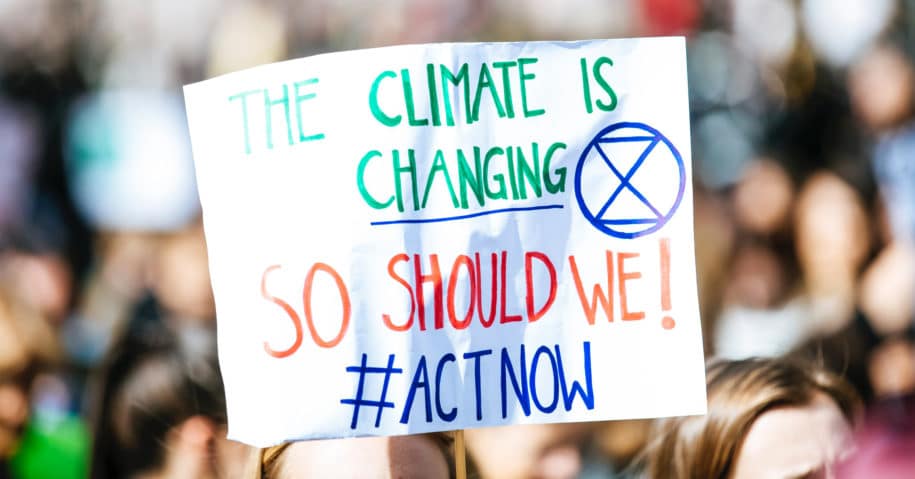Here’s How You Can Help Address Climate Change

Climate change is one of the greatest challenges of the modern age, and dealing with it can seem daunting, especially to an individual. The EPA reports more than 75% of all greenhouse gasses come from mass transportation, electricity manufacturing, and industrial processes. This means the vast majority of climate change is not directly caused by everyday people. That being said, we do play an indirect role in many of these processes. It is extremely important for every person to understand their own impact on the climate, and how to make sustainable personal changes a reality.
It is clear that large-scale change must be implemented by governing bodies to combat climate change on a global level. Regulation on industry and the amount of greenhouse gasses they produce could greatly help combat climate change, along with banning unsustainable practices like deforestation and fracking.
There are currently many fighting for long-lasting change, like the Environmental Voter Project, whose team of dedicated volunteers diligently works to get voters to cast their ballots with the environment in mind. There are also massive reform bills like the Green New Deal, which illuminate how the country can end its reliance on fossil fuels and build toward a green future.
Most Americans believe the federal government should do more to combat climate change. However, many do not want their own lives to drastically change. Climate change deniers have spread misinformation about renewable energy being ineffective, expensive and even destructive. While these claims are simply untrue, any change is intimidating to everyday people who want their quality of life preserved. But changes in habit do not need to be drastic to still have a powerful impact.
Climate Action Starts Now
While by no means the leading cause, there is no denying that everyday people are having an effect on climate change, especially in America. While an ordinary citizen’s impact may appear minuscule in contrast to companies and governments, the collective environmental effect of all people is staggering and warrants concern. The first step in your personal sustainability journey is to analyze your own lifestyle. There are dozens of minor questions which can illuminate new avenues to create impactful change:
- Have you replaced your incandescent light bulbs with LEDs?
- How much do you drive a week?
- Is the food you eat locally sourced?
- How much water do you use in a week?
- How often do you use public transportation?
You can use your answers to these questions to calculate your ecological footprint, and determine where you produce the most carbon. Once calculated, you should examine your routines, looking for changes to reduce waste and foster a sustainable lifestyle. Here are a few examples to get you started.
Cycling is one of the best ways to reduce your carbon footprint. Especially for urban residents, biking is a completely green means of transportation which has become far more accessible in the last few decades. Almost every major city around the world has bike lanes dotting the streets and bike racks lining public spaces and walkways. City planners are reshaping modern cities to be bike friendly, aware of the growing enthusiasm for the activity. However, many Americans simply cannot ditch their cars for bikes. In these cases, there are numerous green changes which can be made around the home.
Plant-based diets have been gaining a lot of attention, with many high profile restaurants – like McDonalds, Burger King, and White Castle – offering plant-based meat substitutes. The production of meat, especially beef, creates massive amounts of greenhouse gases every year. Switching to a plant-based diet combats this growing issue, and helps drive down the national demand for meat. More than likely meat will remain a part of the human diet for the foreseeable future, but reductions of national meat processing (even small ones) can greatly decrease the amount of methane released into the atmosphere by cattle and manure. With a proven and growing interest in meat substitutes, switching to a plant-based diet is a great first step for making your life more sustainable.
Start Your Climate Journey

These two options are only scratching the surface of personal climate growth. There are dozens of options ranging in effort and price which help combat climate change, and a bevy of avenues you can take in your climate journey. It only takes a little creativity and dedication to make it happen.
The thought of facing climate change might feel overwhelming, but it is important to know that it can and must be done. Large-scale legislation must be passed to combat the issue on a global level: voters must tell their representatives to work for the future by addressing climate change now. But some of the onus of saving the planet must fall on individuals. In the fight for a greener future, your actions matter.
To learn more about what you can do to combat climate change, explore Impactree’s Climate Group for more solutions and resources.

